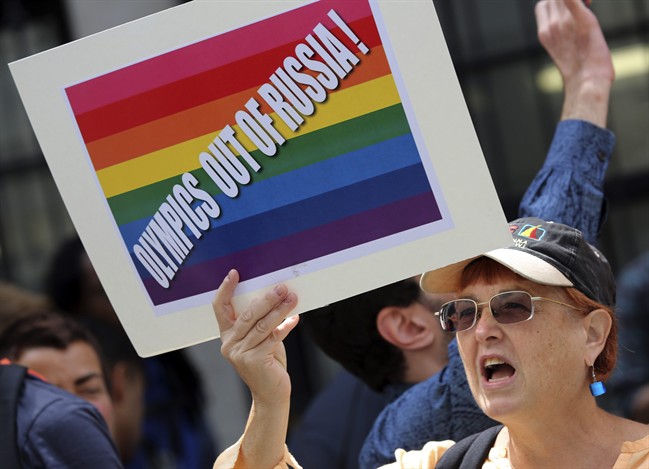EDMONTON – In light of Russia’s controversial anti-gay legislation, some advocates argue boycotting the Winter Olympics in Sochi in 2014 is the strongest way to show Canada’s opposition to the law.

“We can send no greater international message than to boycott the Olympics,” says Kris Wells with the Institute for Sexual Minority Studies at the University of Alberta. “I know many people feel that it’s a futile effort, and that the Olympics are not a political event, but on a geopolitical scale, it’s naive to think that politics is not everywhere.”
“Perhaps the only bottom line Russia will listen to is the economic one,” Wells adds.
While some advocates feel a boycott is necessary, one athlete Global News spoke to expressed disagreement, saying there are other ways to get the message across.
“I’m an out gay man and I’m going to a country where it’s basically illegal to be gay,” shares Olympic speed skater Blake Skjellerup. “I think that’s a huge show of support in itself. I don’t know what greater thing I could do.”
And, while sexual orientation doesn’t normally play a role in an athlete’s preparation, it does now. Russia passed a law in June that made it illegal to spread “gay propaganda.” Simply waving a rainbow flag can lead to arrest.
“It’s sad to see Russia basically going in the exact opposite direction; passing these draconian laws which are persecuting people for loving somebody else,” says Skjellerup.
However, instead of boycotting the Games, he says going to Russia as an openly gay athlete will be his statement.
“I believe in visibility. I believe it’s much more important to be there in Russia, to show our support for the LGBT people of Russia and to know that we are there, and we are in support of them, and that we’re doing our best, I guess, to try to make things better for them in their country.”
“I’m going to go there and be myself and I think that’s a huge show of support and a statement in itself.”
Skjellerup has been skating since he was ten years old.
“I’m in love with this sport and it’s been my life for the last 18 years.”
That dedication and passion earned him a spot at the Vancouver Olympic Games in 2010 where he represented New Zealand.
“I was proud of myself because I worked very, very hard to achieve that, put a lot of time and effort, gone through a lot of sacrifices to make it.”
Skjellerup now trains in Calgary. He spends eight hours a day, six day a week on the ice in the hopes of qualifying for all three short-track speed skating events at the Sochi Olympics.
According to Patrick Burke, co-founder of You Can Play, the presence of athletes like Skjellerup in Russia will make a difference.
“We’re going to have more of an impact if we send LGBT athletes there, if we send pro-gay athletes there who can help change the culture behind the laws and not just focus on the laws themselves.”
But Wells feels Canada’s absence from the Games would get the point across much more clearly.
“The world can’t stand by and idly watch these human rights abuses happen. It’s our silence that will be remembered,” he explains.
“We need to stand up and we need to take action and we need to send a loud and strong message to Russia. We will not bring the world together to celebrate those Olympic ideals of respect, inclusion, and acceptance in a country that is blatantly targeting some of its most vulnerable citizens.”
“I don’t know how we can, in good conscience, move forward to support an event in a country that is so blatantly attacking human rights.”
The International Olympic Committee released a statement in relation to the law:
“The International Olympic Committee is clear that sport is a human right and should be available to all regardless of race, sex, or sexual orientation. The Games themselves should be open to all, free of discrimination, and that applies to spectators, officials, media and of course athletes. We would oppose in the strongest terms any move that would jeopardize this principle.
As you know, this legislation has just been passed into law and it remains to be seen whether and how it will be implemented, particularly as regards the Games in Sochi. As a sporting organization, what we can do is to continue to work to ensure that the Games can take place without discrimination against athletes, officials, spectators, and the media. To that end, the IOC has received assurances from the highest level of government in Russia that the legislation will not affect those attending or taking part in the Games.”
However, last week, Russia’s minister of sport was quoted as saying athletes will be subject to the new law.
With files from Vassy Kapelos, Global News



Comments